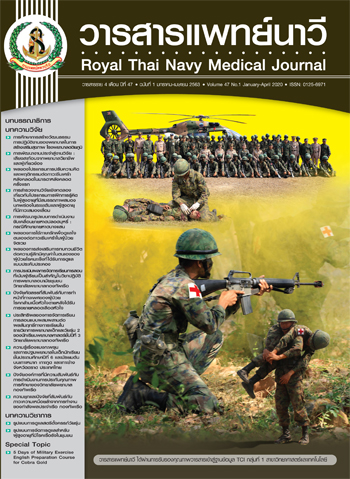The Effect of Cognitive Behavioral Therapy Program on Postpartum Depression among Primiparous Mothers
Main Article Content
Abstract
Postpartum depression is a significant problem in Thailand. Depressive symptoms if deteriorated, it can progress to be depressive disorders and postpartum psychosis. The purpose of this quasi - experimental research was to examine the effect of cognitive and behavioral therapy program on postpartum depression in primiparous mothers. The sample included twenty primiparous mothers who met the inclusion criteria. The participants were randomly assigned into the experimental (n= 10) and the control (n= 10) groups. The experimental group received group cognitive modification program for 6 sessions, two sessions per week and each session took about 60 to 90 minutes. Where as those in the control group received only routine nursing care. The Edinburgh Postnatal Depression (EPDS) were used to collect data at pre-post tests and one month follow-up. Descriptive statistics, repeated measures ANOVA and pairwise comparisons using Bonferroni’s method were employed to analyze the data
The results showed significant decrease for the mean scores of postpartum depression between the experimental and control group at post-test and 1 month follow-up (p < .001). In the experimental group, the mean scores of postpartum depression at pre-test, post-test and 1 month follow-up were significant different (p < .001)
From the results, it showed that cognitive and behavioral therapy program had significant effects on postpartum depression among primiparous mothers. Therefore, nurses and related health personnel could apply this program in order to reduce depression among postpartum mothers in other groups
Article Details

This work is licensed under a Creative Commons Attribution-NonCommercial-NoDerivatives 4.0 International License.
References
World Health Organization. Maternal and child mental health. [Internet]. [cited 2017 February 25]. Available from: https://www.who.int/mental_health/maternal-child/en/.
Klainin P, Arthur DG. Postpartum depression in Asian cultures: a literature review. Int J Nurs Stud 2009;46(10):1355-73.
Kendall-Tackett KA. Depression in new mothers: causes, consequence, and treatment alternative. 2nd ed. New York: Routledge; 2010.
Ghorbanshiroudi S, Azari NK, Khalatbari J, Charmchi N, Keikhayfarzaneh MM. An overview of the prevalence of postpartum depression. Journal of Basic and Applied Scienes 2011;1(12):3230-5.
Sriaporn P, Suntornlimsiri N, Juntratit K, Deeluea J, Nunchai J, Khiakham P. Factors related to postpartum depression among first time mothers and fathers. Nursing Journal 2015;42(3):37-50. (in Thai).
Sitthiboonma N. Stress, social support and postpartum depression among primiparous mothers. [Master’s Thesis, Faculty of Nursing]. Chiang Mai University; 2015. (in Thai).
Berger FK, Jolla L, Zieve D, Ogilvie I, the A.D.A.M. Editorial team. Postpartum depression. [Internet]. [cited 2017 February 26]. Available from: https://medlineplus.gov/ency/
article/007215.htm.
Joy S, Mattingly PJ, Templeton HB, Isaacs C, Contag SA, Trupin SR, Talavera F. Postpartum depression. [Internet]. [cited 2017 February 26]. Available from: https://reference.medscape.com/article/271662-overview#showall.
C-Maharsujchakuen J, Uthis P. The effect of mindful self-compassion training program on depression in persons with depressive disorder. Royal Thai Navy Medical Journal 2019;46(1):98-114. (in Thai).
Beck CT. Perceptions of nurse’s caring by mother experiencing postpartum depression. J Obstet Gynecol Neonatal Nurs 1995;24(9):819-25.
Grace SL, Evindar A, Stewart DE. The effect of postpartum depression on child cognitive development and behavior: a review and critical analysis of the literature. Arch Womens Ment Health 2003;6(4):263-74.
Stuart S. Interpersonal psychotherapy for postpartum depression. Clin Psychol Psychother 2012;19(2):134-40.
Hamilon L. CBT for postnatal depression (PND). [Internet]. [cited 2019 September 12]. Available from: https://www.kinsalecbt.com/postnatal-depression-pnd.
Mathews E. What can I do if I think I have postnatal depression and anxiety? [Internet]. [cited 2019 September 12]. Available from: https://www.efficacy.org.uk/
blog/authors/emma-mathews.
Pugh NE, Hadjistavropoulos HD, Dirkse D. A randomized controlled trial of therapist-assisted, internet-delivered cognitive behavior therapy for woman with maternal depression. PLOS ONE 2016;11(3): e0149186.
Milgrom J, Danaher BG, Gemmill AW, Holt C, Holt CJ, Seeley JR, et al. Internet cognitive behavioral therapy for women with postnatal depression: a randomized controlled trial of mum mood booster. J Med Internet Res 2016;18(3):e54. doi: 10.2196/jmir.4993.
Beck JS. Cognitive therapy: basics and beyond. 2nd ed. New York: The Guilford Press; 1995.
Beck AT. Depression: clinical experimental and theoretical aspect. New York: Hoeber Medical Division; 1967.
Srisatidnarakul B. The methodology in nursing research. 5th ed. Bangkok: You and I inter media; 2010. (in Thai).
Thato R. Nursing research: principles and methods. 2nd ed. Bangkok: Chulalongkorn University Printing House; 2009. (in Thai).
Cox JL, Holden JM, Sagovsky R. Detection of postnatal depression: development of the 10 item Edinburgh postnatal depression scale. Br J Psychiatry 1987;150:782-6.
Pitanupong J, Liavsuetrakul T, Vittayanont A. Validation of the Thai Edinburgh postnatal depression scale for screening postpartum depression. Psychiatry Res 2007;149(1-3):253-9.
McCabe-Beane JE, Segre LS, Perkhounkova Y, Stuart S, O'Hara MW. The identification of severity range for the Edinburgh postnatal depression scale. Journal of Reproductive and Infant Psychology 2016;34(3):293-303.
Nelson-Jones R. Thinking skill: managing and preventing personal problems. California: Brooks/Cole; 1990.


